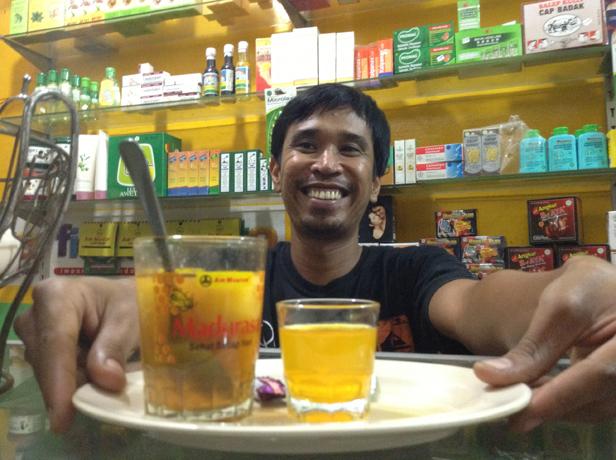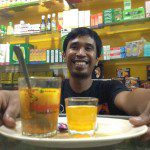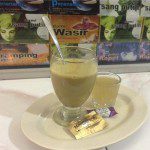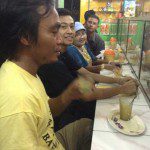Cocktail of the Month
By • June 4, 2014 0 1850

No matter where you go in Indonesia, you will see them. A small storefront with a counter, a vendor on the street. They are dispensing drinks of an odd consistency: most of them thick and gooey, like globs of brownish mud. These curious potables can be purchased at one of the incalculable number of jamu shops that fill this island nation.
Jamu is a traditional herbal medicine from Indonesia, dating to ancient times. While little known in the States, jamu is widely used by locals. Indigenous healers, or dukuns, were the original jamu practitioners, but now it is more widespread than CVS in D.C.
A mixture of plants, leaves, seeds, herbs, bark, spices, fruits and flowers, jamu is purported to cure everything. It can treat diabetes, lower cholesterol, eliminate body odor, improve sexual stamina, cool the body, cure arthritis and even provide harmony within your family. The list goes on and on. Depending on the ailment, a different combination is prescribed.
Commercially prepared jamu is widely available, but most prefer to have it freshly made at a shop, where they can get a custom blend. It comes in tablets, powders and teas, but is most commonly consumed as a drink. Sometimes it is served in a combination of these.
My first jamu experience came courtesy of my friend Henry Kunjuik, who runs three jamu shops in Denpasar, the busy capital of Bali. Over the course of my nine months in Indonesia, Henry has treated me for a leg infection, hangovers and cuts and scrapes.
Henry comes from Padang, a region of Sumatra famous for its spicy food. He has been practicing jamu in Bali for more than seven years. He and his older cousin learned to make jamu from a master jamu guru in Java. Henry works at one of his stores and has taught his younger brothers how to run the other two.
Located on a busy thoroughfare, his main store opens around 4 p.m. every day to provide a relief for tired souls coming home from work and looking for a pick-me-up. He stays open until 1 or 2 a.m. In the meantime, his shop becomes a gathering point for a truckload of friends he refers to as brothers.
The typical jamu order is a customized combo of a thick, freshly prepared natural smoothie with a shot of juice or tea and a tablet on the side. The most popular requests can be ordered from a menu, divided into jamu for men, jamu for women and jamu for both sexes. An average serving costs about 8,000-12,000 rupiah (72-94 cents), depending on the mixture and the type of egg used (duck or chicken).
Jamu Pegel Linu, which relieves muscle fatigue and helps one get a good night’s sleep, is the most frequently ordered item on the menu. Customers can expect to wake up the next morning rested and ready to go. “You work hard all day, then you’re so tired, “ says Henry. “Then you drink jamu before you sleep and when you wake up you much feel better.”
When I ask Henry for an analysis of the natural ingredients, he recites a list of Indonesian words. While some are familiar – like ginger, citrus and turmeric – most of the words can’t be deciphered by Google’s online translator. In Indonesia, words vary not only from English, but from one island to another.
Two of the ingredients common to most jamu drinks are egg and honey. It is generally believed in Indonesia that when mixed together they increase stamina. (If you want to make jamu at home, you will have to have most of the ingredients shipped to you, since they are native only to Indonesia. You can also order commercially made powders online.)
Henry mixes up a concoction to relieve my insomnia and teaches me to drink like a local. First, he whips up a thick sludge using a mixer mounted to the counter. I watch as he cracks an egg into a cup and throws in various powders, Beras Kencur –a locally produced juice infused with herbs – and a special honey only made and sold for jamu.
After a series of whirs and clanks, Henry pours a thick goop into a glass. He offers me a sample first. It’s bitter and medicinal, a bit like Jagermeister. He rims the glass with lime and squeezes the remaining juice into my glass, which adds a pleasant citrus flare.
My prescription is served on a plate, along with a sunny glass of Henry’s handcrafted ginger tea, a tablet of commercially made jamu and a piece of candy for dessert.
I am instructed to chug the jamu and chase it with the sugary tea. The smack of the sweet and spicy ginger provides a lovely contrast to the herbaceous jamu, washing down the slurry with a refreshing twist. I finish up by taking the tablet with the remaining tea and skip the candy.
Maybe it’s the power of suggestion, but I begin to feel invigorated almost immediately. When I go home that night, I ease into a soothing slumber.
- Henry Kunjuik serves an order of jamu at his shop.






